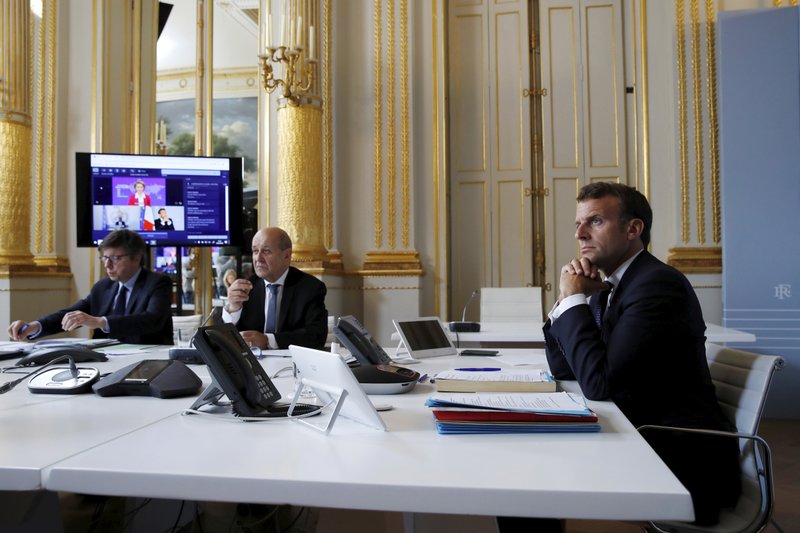BRUSSELS -- World leaders, organizations and banks Monday pledged $8 billion for research to find a vaccine against the new coronavirus but warned that it is just the start of an effort that must be sustained over time to beat the disease.
The funds, pledged at a video-conference summit hosted by the European Union, fell marginally short of the sum being sought, but more could arrive in coming days. Notably absent from the event was the United States, where more than 68,000 people have died, and Russia.
U.N. Secretary-General Antonio Guterres said the funding to help find a vaccine, new treatments and better tests would only amount to a "down payment" on the tools that will be needed to fight the virus.
"To reach everyone, everywhere, we likely need five times that amount," Guterres said.
Asked about the American absence, which comes after it suspended funding to the World Health Organization, a senior U.S. official said "the United States is in the process of providing $2.4 billion in global health, humanitarian, and economic assistance towards the COVID-19 response, and we continue to ensure that the substantial U.S. funding and scientific efforts on this front remain an essential and coordinated part of this worldwide effort against COVID-19."
[CORONAVIRUS: Click here for our complete coverage » arkansasonline.com/coronavirus]
French President Emmanuel Macron said he is confident the U.S. will join the initiative at some point, stressing that he personally discussed the issue with President Donald Trump. Macron noted that the U.S. "is on the sidelines," but added that it doesn't compromise or slow down the project.
Governments have reported almost 3.6 million infections and more than 251,000 deaths from the virus, according to the count by Johns Hopkins University.
Authorities remain wary of a second wave of infections, and a vaccine is the only real golden bullet to allow something like normal life to resume.
"In the space of just a few hours, we have collectively pledged 7.4 billion euros for vaccines, diagnostics and treatments," European Commission President Ursula von der Leyen said, wrapping up the event after three hours. "All this money will help kick-start unprecedented global cooperation."
The pledges were hard to track, beyond coming in various currencies. Some countries announced money for their own national research efforts combined with those they would offer to international organizations. Others also proposed a mix of loans with their funding. Pledges made toward vaccine research since Jan. 30 were also counted.
British Prime Minister Boris Johnson said "the race to discover the vaccine to defeat this virus is not a competition between countries, but the most urgent shared endeavor of our lifetimes."
Macron warned that "a race against time is underway," as he donated the equivalent of $545 million on behalf of France.
Large pledges also came from Japan, Germany, Italy, Spain, Switzerland, the Netherlands and Israel.
Melinda Gates, co-chair of the Bill and Melinda Gates Foundation, said beating the virus "will take more than making a vaccine available to the very highest bidder. It is going to take more than delivering it only to people in wealthy nations. The pandemic won't end until people everywhere can be immunized against it."
About 100 research groups are pursuing vaccines, with nearly a dozen in early stages of human trials or poised to start. But so far there's no way to predict which -- if any -- vaccine will work safely, or even to name a front-runner.
Dr. Anthony Fauci, the U.S. government's top expert, has cautioned that even if everything goes perfectly, developing a vaccine in 12 to 18 months would set a record for speed.
Even if a first useful vaccine is identified, there won't be enough for everyone initially. A growing number of vaccine makers say they're already starting to brew tons of doses -- wasting millions of dollars if they bet on the wrong candidate but shaving a few months off mass vaccinations if their choice pans out.
Information for this article was contributed by Sylvie Corbet, Jamey Keaten and Matthew Lee of The Associated Press.
A Section on 05/05/2020

